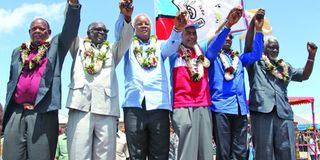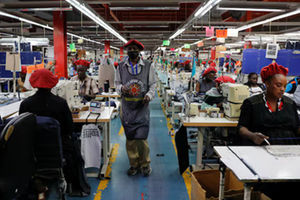Prime
Why 2015-style opposition coalition may not materialise this time around

In 2015, Tanzania's political landscape experienced a major transformation with the establishment of Ukawa, a coalition uniting several opposition parties. PHOTO | COURTESY
What you need to know:
- While Ukawa was initially seen as a powerful force, its internal struggles, mistrust among coalition members, and changes in the political environment have made the prospect of another unified opposition effort difficult.
Dar es Salaam. In the lead-up to Tanzania’s 2025 general election, the possibility of another opposition coalition similar to Ukawa seems increasingly unlikely.
The political landscape has shifted significantly since 2015 when Chadema, CUF, NCCR-Mageuzi, and NLD came together under the Umoja wa Katiba ya Wananchi (Ukawa) banner to challenge the ruling party, CCM.
While Ukawa was initially seen as a powerful force, its internal struggles, mistrust among coalition members, and changes in the political environment have made the prospect of another unified opposition effort difficult.
Speaking with The Citizen, yesterday, the deputy chairperson of NCCR-Mageuzi Mainland, Joseph Selasini, openly dismissed the idea of his party joining another opposition coalition.
He pointed to the betrayals within Ukawa as a key reason: “We cannot unite with others as we did in 2015 because we were betrayed. A plan was drawn up to allocate constituencies to specific parties, but even within the constituencies given to us, other Ukawa parties fielded their candidates. This led to our representation dropping from four MPs in 2010 to just one in 2015.”
Mr Selasini also highlighted the issue of political party funding, explaining that the coalition structure benefited some parties while weakening others.
“In this system, the party with the most representatives gets the largest funding. When you promote a single candidate from one party, you are essentially supporting that candidate and their party, while leaving the smaller parties weaker because they are not often mentioned during elections,” he shared.
He further argued that larger opposition parties took control of power and resources, marginalising smaller coalition members.
“The parties with more MPs hold all the power, especially when it comes to appointing special seats. These parties take all the seats without the decency to share them with other coalition partners. This is a strategy to eliminate other opposition parties and stifle their growth,” he said.
For him, 2025 should not be about forming a coalition for the sake of one party or individual but about strengthening opposition politics as a whole.
“This year is for genuine political action, not for escorting one individual or one party to success. We must focus on building strong opposition, not merely supporting the rise of a single party,” he added.
While NCCR-Mageuzi has distanced itself from coalition talks, ACT Wazalendo has taken a different approach.
The party’s Secretary-General, Ado Shaibu, has emphasized the need for collaboration among opposition parties to push for electoral reforms.
“ACT Wazalendo is fully prepared to work together with all genuine opposition parties in the fight for electoral system reforms. This is a crucial moment in our political journey, and we recognize the importance of unity in advocating for a fair and transparent electoral process,” he noted.
ACT Wazalendo has already reached out to Chadema, CUF, and ADC, considering them natural allies since they boycotted the previous Local Government Elections.
“We have already met with Chadema once. Myself, alongside the Deputy Chairperson for Mainland, represented ACT Wazalendo in a meeting with the Chairman of Chadema. During that meeting, we shared our vision for reform and discussed the way forward. It was a productive discussion, and we are optimistic that, following these initial talks, we will move into more formal discussions about how we can collaborate, not just on reforms but also in the context of the upcoming elections,” he shared.
Mr Shaibu insists that these efforts are about more than just electoral alliances; they are about securing lasting changes in Tanzania’s political system.
“Our discussions are about more than just electoral politics. They are about creating a system that works for all Tanzanians, one that ensures fairness, transparency, and a level playing field for all political parties,” he asserted.
Also read: Now Ukawa seeks to edge CCM in 2015
Chadema, remains firm in its demand for electoral reforms before any discussions on a political alliance.
Secretary-General John Mnyika has repeatedly insisted on their campaign of ‘No reforms, no elections.’
“Chadema is committed to ‘No reforms, no elections.’ We are clear in our position that the current electoral system is flawed and cannot produce free and fair elections. We will not participate in any election until comprehensive electoral reforms are implemented,” he said.
He shared that Chadema is open to collaborating with any opposition party willing to push for these reforms.
“If there is any party willing to align with our campaign for reforms, we are open to collaborating with them. Our priority is the reform of the electoral system, and we are willing to join hands with any party that shares this vision,” he explained.
However, he clarified that forming an election coalition is not a priority at the moment.
“As for uniting with any party for the election itself, this will be a matter to consider only after the electoral reforms have been completed. Without these reforms, we do not see how the general election this year can be legitimate or meaningful,” he revealed.
For Chadema, participating in an election under the current system would mean endorsing an unfair process, he said: “We cannot, in good conscience, participate in an election under the current circumstances. The reforms must come first, and only then can we start thinking about the election and potential collaborations.”
For her part, Deputy Chairperson of CUF for Mainland, Magdalena Sakaya, provided additional insight into the legal and practical challenges that make another UKAWA-style coalition difficult.
She pointed out that recent legal changes have made it harder to form alliances in time for the elections.
“Due to the recent changes in the law, it is now a requirement that any party wishing to ally must do so at least six months before the election. This is a significant challenge, as there is limited time left to prepare, especially at the grassroots level of the party,” she noted.
She also discussed CUF’s previous engagement with ACT Wazalendo, explaining that an attempt to collaborate on the Local Government Elections did not materialize.
“ACT Wazalendo suggested that we sit down together and deliberate on matters related to the local government elections. However, we were preparing for our own party’s major meeting, and we informed them that it would be difficult to meet and discuss election matters at that time. There was no follow-up on that matter,” she said.
Ms Sakaya acknowledged that opposition unity has historically been crucial but blamed past betrayals for the current divisions.
“History shows that no single opposition party has ever successfully challenged the ruling party without uniting with others. However, the situation with UKAWA was different. The parties involved had agreed that constituencies should be allocated according to the strength of each party in that particular constituency. But later, we were surprised to see parties that had not been permitted to field candidates in certain areas go ahead and nominate candidates, causing other parties to lose constituencies,” she said.
She argued that such actions damaged trust among opposition parties and made it difficult to form another coalition like Ukawa.
“Some parties even went as far as deceiving CUF members into taking nomination forms through their party, without them realising they were weakening their party and strengthening another. Such betrayal has made it difficult to form another Ukawa, as trust has been broken, and the willingness to unite is now compromised,” she noted.
Ms Sakaya stressed that any future alliances must prioritize the well-being of Tanzanians: “One of the key criteria for any party that wishes to join forces with CUF in the next election is that it must prioritize the lives of the people, especially those in lower-income communities. The fight against poverty must be at the forefront of any coalition.”
What political analysts say
A political analyst from the University of Dar es Salaam, Dr Onesmo Kyauke, believes that the failure of UKAWA to sustain itself beyond 2015 has created a trust deficit among opposition parties.
“The biggest challenge facing the opposition today is trust. UKAWA collapsed because of internal wrangles, power struggles, and resource distribution conflicts. For another coalition to emerge, parties must first address these fundamental issues,” he said.
Dr Kyauke further noted that the shifting political environment, including legal reforms, has made coalition-building more difficult.
“The Political Parties Act amendments now require coalitions to be formed at least six months before the elections. This limits the flexibility of opposition parties, forcing them to make early commitments, which they might not be ready for,” he explained.
His counterpart, Dr Richard Mbunda, also from the University of Dar es Salaam, argues that the opposition’s survival depends on its ability to craft a new strategy beyond coalitions.
“Ukawa was effective in 2015 because it had a common enemy and a single presidential candidate. Today, opposition parties are divided, and their priorities differ. Chadema is focusing on electoral reforms, ACT Wazalendo is advocating for broader cooperation, while others are sceptical about any alliances. This lack of a common goal makes it harder to replicate Ukawa,” he observed.





